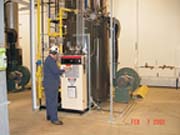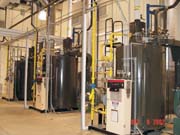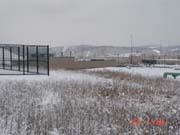
Moving a Prison
The city of Pittsburgh had an existing correctional institution that, over the years, became too old and too small for the city's needs. So, a few years ago, it was decided to transfer the jobs and money that Pittsburgh would lose when the facility was closed to an area with a far less robust economy. Fayette County was finally agreed upon. But the building site that was chosen created a real challenge.The state decided to locate the institution on top of a four-hundred-foot precipice that borders the Monongahela River, where the nearest town is on the other side of the river and the nearest bridge nine miles away. At the base of the precipice, there is a small ferry, one of the few remaining cable ferries in the country, and only small communities populate the area around the facility, making it an isolated location.
In order to protect the site from the weather, and more importantly, prevent it from becoming an eyesore to the area's residents, it was decided to dig out part of the top of the mountain to create a bowl-like indentation in which to construct the prison. The civil work included cutting approximately 100 feet off the top of the mountain to create the bowl.
Because of the location and budgetary constraints, the original design had called for three large, firetube oil-burning boilers. Pennsylvania, like many other states, mandates that a new state facility must use indigenous fuel. Northwestern Pennsylvania has oil around Erie and Oil City. However, space constraints made installing the firetube boilers impractical.
Due to operational cost concerns and increasing oil prices, the use of oil was reviewed, and a closer look was taken at using coal or waste coal indigenous to the area. As there are a lot of waste coal piles in the southern and southwestern parts of the state where the facility was to be located, waste coal seemed to be the most economical long-term way of providing steam. That's when Power Consultants was called in. The firm specializes in building steam facilities using energy from waste fuels such as coal.
Having already completed the engineering of the facility, the state's budget for changes was limited. So, Power Consultants proposed that a private entity, Fayette Thermal, build, own, operate and service a free-standing boiler plant (not the central utility plant on the facility grounds) using bituminous coal tailings in high efficiency fluidized bed boilers. They would supply the facility's steam needs under a long-term contract. The fluidized bed boiler plant would be 3,000 feet away--three quarters of a mile--from the facility, on its own property. It would contain two fluidized bed boilers fired by the waste coal readily available in the area. Each would provide 15,000 pounds per hour (500 hp) of steam. As for the central utility plant that was too small for firetube boilers, it had plenty of room for another part of the solution.

Instantaneous Back-Up
When you are dealing with coal, it is a practical understanding that you are occasionally going to have problems. To provide a fail-safe system, Power Consultants, Inc. had to plan for every eventuality, making an instantaneous back-up paramount.The high efficiency, fluidized bed coal boilers would be the heart of the facility's steam plant. But Power Consultants chose Miura boilers to give a highly reliable instantaneous back-up to the coal-fired system. Miura boilers are ultracompact and take up a fraction of the space of firetube boilers, so they could easily fit into the central utility plant.
The Miuras would be located in the institution's central utility plant. Jacek Grob, the Miura sales engineer who worked with Power Consultants, said the Miuras were chosen because "Miuras were the only boilers capable of providing a back-up in five minutes." In fact, the Miuras are not only acting as back-up boilers, but until the coal boilers are up and running, the Miura boilers are carrying the entire steam load for the empty facility. According to David Goldsmith, Power Consultants' design engineer, "The Miuras fit this scenario extremely well. We've housed three, 300 hp EX gas-fired watertube Miura boilers in the central utility plant, which is on the facility grounds, but outside the secure facility walls. The accommodation is there for a fourth boiler to go in, when and if they expand the facility to a larger population. The fluidized bed boilers, which are 3,000 feet away from the facility on their own property, are connected by a steam line to the central utility plant."
Fayette Thermal owns the three Miuras inside the central utility plant. Those are on a lease-back basis, so that eventually the state will own them. Fayette Thermal operates them all under a 25-year steam sales agreement.

Five Minutes from Zero Pressure, Cold, to Operating Pressure
Goldsmith further justified his choice, saying, "The really important criteria for the design of these plants is instantaneous back-up. The Miuras go from zero pressure, cold, to operating pressure in five minutes. That has enormous benefits for an emergency system--or a back-up system."Maintaining the steam demand at the correctional facility is quite volatile, and that is another reason why we need the Miura's instant response. For example, as you can well imagine, the inmates have to shower once a day. Just imagine 2,000 people showering in a three-hour period. If the two coal-fired boilers at the top of the hill are chugging along but can't respond fast enough to the steam requirements, then of course, one of these little Miuras kicks on and almost instantaneously supports the additional requirements.
"What happens with Miuras is that by operating a bank of them as opposed to one or two, you end up with savings associated with having them come on and off as needed--each of them operating at optimum efficiency. Other boilers have to remain on-line all the time and resultant load swings cause much lower efficiency and costs you an arm and a leg."
For more information, contact Miura Boiler, Inc., 600 Northgate Pkwy, Suite. M, Wheeling, IL 60090-3201, (847) 465-0001, fax (847) 465-0011, e-mail: Chicago@miuraboiler.com, Web: www.miuraboiler.com.